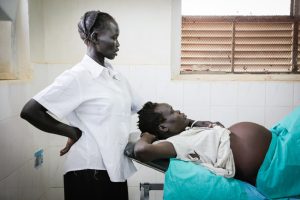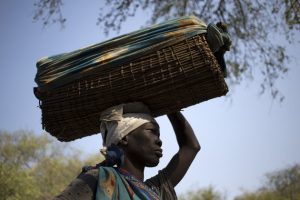A woman walks into the labor ward, straight through to the delivery table.
Five minutes later her baby is born.
Two hours ago, she was in active labor and told to stay in the hospital for monitoring, however she went to the market to do some last minute errands.
Women in South Sudan are fierce and resilient and this is seen every day when they labor with no expectation of pain relief, carry construction supplies across thorn-filled dirt paths and pump and carry endless jerry-cans of water to their families.
The media reports on the blood-filled disputes of men – cattle raids, failed peace agreements, lost boys and family feuds; meanwhile, the persistent hard work of women holds South Sudan together. Woman here are powerful. They are hard workers and amazing mothers of many, MANY children.
It’s not uncommon for a woman in her late 30’s to have 10 children. It’s a source of pride, protection, and an insurance policy against a very high infant mortality rate. And of course, having many children means that the all-important exchange of cattle will continue to drive familial relations.
In the age of hypno-birthing, scheduled C-sections, epidurals, music therapy, pain medications, and air conditioned, clean and cushioned private laboring rooms for women lucky enough to be living in the ‘right’ country, options like these are simply not available here.
In South Sudan, a woman can be seen as strong if she has her first baby at home, surrounded by family. If both survive the process of labor, there is perceived status to be attained. It’s a game of chance, and the odds are not in the favor of women.
South Sudan has one of the highest maternal mortality rates in the world. Women with complications will labour for days before making the journey to Lankien hospital, sometimes because of the wet season and distance, and sometimes because of customs or lack of a care-taker for the other children.
Despite repeated community meetings with Traditional Birth Attendants (TBA), outreach messages, and trainings on the importance of delivering in a hospital, the majority of women have children at home. Still, many women do come to the hospital for check-ups, vaccinations and delivery. Change comes slowly and things are improving.




